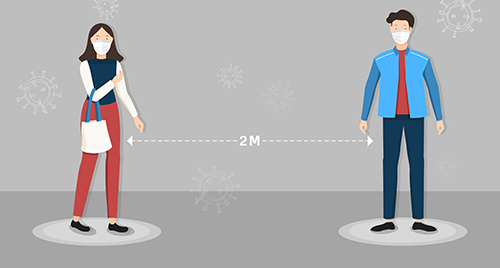
Professor Neil Budworth, Head of Health and Safety, Loughborough University and Chair of the Universities Safety and Health Association (USHA)
9 June 2020
A flexible response to a diverse Covid-19 “pandemic experience”
We’ve been working at home for so long now it’s starting to feel like the new normal… Teams, Zoom and Skype are among our new best friends (and sometimes enemies!) and the daily competition as to who has the most interesting background continues apace.However, the Covid-19 “pandemic experience” simply hasn’t been the same for everyone. Some people have found themselves with time on their clean hands; time to reflect, learn a new skill, worry or just recharge. Meanwhile others have been pedal to the metal continuously since the start of the year.
Having access to outside space, locking down alone, or with family are all factors which have influenced peoples’ experience. All this alongside trying to juggle a full-time job, full-time educational responsibilities and childcare is incredibly testing. The weight of this extra responsibility has been disproportionately felt by women. Of course, others have had to cope with care of, or even the loss of a family member. So it is perhaps no surprise that people are reacting differently to their changed working environment.
The reality is that people had to completely change their work environment and method of work almost overnight. All at a time when our social support networks are disrupted.
This is why the support we at Loughborough University offer people needs to be flexible with mental and physical wellbeing at the heart of our People and Organisational Strategy, and therefore, at the heart of our response to the Covid-19 pandemic.
We quickly established a dedicated website looking at four areas:
- IT – A section helping get people online, with self-help videos supporting them to access and use the new software. The aim was to reduce stress by making, getting and working online easier and straightforward.
- Physical health – Recognising that individuals have had to quickly establish a home workstation. We gave clear guidance on setting up a workstation, getting comfortable and keeping active (through exercise videos.)
- Support for managers – suggesting ways of supporting teams through rapid changes; signposting help, giving suggestions for staying in touch and replicating informal discussions to keep colleagues connected and engaged.
- Mental wellbeing – addressing the significant and potentially longer-term risk.
Mental wellbeing support
Initially we quickly enhanced and refreshed existing support structures, including enhancing the Employee Assistance Programme to cover family members and enhancing websites to direct colleagues to existing resources.Next we focused on developing additional support to recognise the additional needs of the moment such as virtual resilience training. We provided guidance on structuring the day to help those who have never worked from home before. We introduced the Yellow Book (a set of physical and mental wellbeing resources developed by a local charity – Rethink Your Mind) and introduced a wellbeing app based on the NHS five steps to mental wellbeing. Our Occupational Health Manager has become a fixture at a range of management meetings.
Understandably, the thought of issuing guidance to intelligent staff which began with ‘get dressed in the morning’ provoked a fair amount of anxiety. However, the guidance has been received in the spirit in which it was issued and has been widely supported and welcomed.
Now we are preparing for a future which is likely to be very different to the past. For many, the novelty of working from home and being isolated is rapidly wearing off. It is now that the significant challenges really begin. Processes which were built to deal with a crisis, demanding a rapid response, now need to be adapted for the long term.
Returning to a socially distanced workplace
The whole nature of the national debate is now about health and safety, and the understandable anxiety of a return to a “new normal”. Our narrative, education and support need to reflect that interest.After so many weeks in isolation people are very anxious about returning to the workplace. To make the transition back easier we will need to provide plenty of reassurance and high levels of visibility about the arrangements in place to protect people on their return to work, particularly social distancing arrangements.
Moving back onto campus has required a structured assessment process that considers building readiness, social distancing, training and local risk assessments. The new normal includes one-way systems, room limits, screens, signs, staggered starts and rooms at 20% of their previous capacity.
The real challenges are not with the technical areas but the much more mundane world, of corridors, entrances and loos, that require the most thought.
Back to the future?
Like all HE institutions, Loughborough University is planning ahead. But the uncertainties surrounding the pandemic and the response makes this no mean feat. To try and bring some clarity to a hazy situation we have turned to the frameworks published in other countries. They don’t provide the answer, but they do help to describe what the future might look like in a world of more relaxed social distancing and social bubbles.When we look at supporting people there is a high chance that more financial and bereavement support will be needed. We have to adapt and support our colleagues and friends.
Finally, the virus and associated lockdown has made people re-evaluate what is important in their life and physical and mental wellbeing has shot up the list. Even with the demands of an economic recovery we can expect physical and mental wellbeing to remain core to our strategic agendas. The good news is the clear evidence that investing in this agenda delivers better productivity as well as happier and healthier people.
Neil presented on ‘Preparing for relaxation of lockdown’ at the UCEA Virtual meeting for HRDs on 21 May 2020. UCEA members can access his presentation slides, notes and frameworks for returning to a socially distanced university in other countries, by logging into the Covid-19 member resources pages.



